Review: Sam Wasson - 'The Big Goodbye: Chinatown and the Last Years of Hollywood'
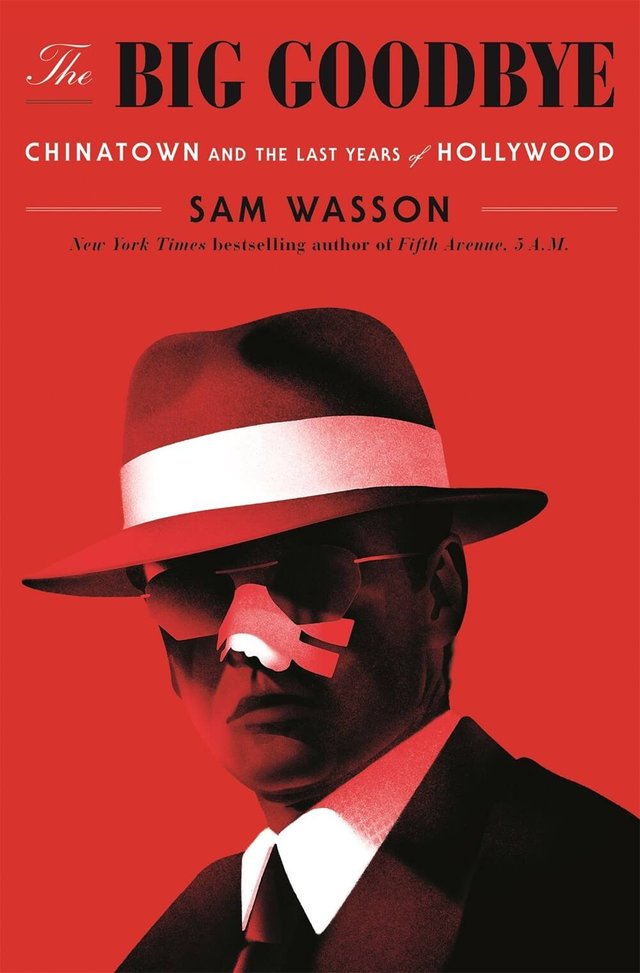
This is a book about a state of mind: Chinatown, not to be confused with a physical locale. It is also a book about the persons who made Chinatown, the film, and how they affected others. Additionally, the book is one big sign-o'-the-times of the 1970s.
The main players are Robert Towne, scriptwriter extraordinaire, Roman Polanski, prodigal director and mess, Robert Evans, film-studio exec-cum-playboy, and Jack Nicholson, Hollywood noveau-golden-age Goose.
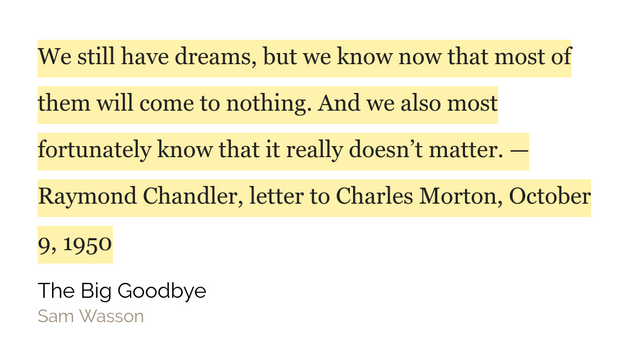
The book reminds me of Peter Biskind's runaway Easy Riders, Raging Bulls which is often described as entertaining, apocryphal, and filled with smear. I cannot say how true this book is, especially as some of its participants are dead and others have not been involved in the making of this book, and as such, I choose to handle it a bit like a fable, something that Werner Herzog refers to as ecstatic truth.
The book starts off with Sharon Tate.
He would stare at Sharon, unbelieving. It was impossible, someone so perfect, and yet, there she was. Wasn’t she? “She was just fantastic,” Polanski would say. “She was a fucking angel.” Her hair of yellow chaparral, the changing color of her eyes, the unqualified kindness of her face. Did people like this exist? In a world of chaos, was it naive to trust, as a child would, the apparent goodness of things, the feeling of safety he had known and lost before?
This book wins, over and over again, by invoking a film-noir atmosphere. Wasson paints such a romantic and straightforward picture of Hollywood at the time, its inhabitants, and the main players who made Chinatown, that I felt the allure of the book and kept coming back to it. It reads like an old-school detective novel.
Robert Towne is a screenwriter with a slew of legendary films under his belt. Before making Chinatown, he was revered and simultaneously forgettable. He needed something to make his mark and keep going.
Towne was in agony. Writing Chinatown was like being in Chinatown. A novelist could write and write—and, indeed, Towne wrote like a novelist, turning out hundreds upon hundreds of pages of notes and outlines and dialogue snippets—but a movie is two hours; in script form, approximately a minute a page. What could he afford to lose? He needed to be uncompromisingly objective, but not so hard on his ideas that he ended up losing what may have been good in them—that is, if there was ever anything good about them to begin with. Was there? The question had to be asked. Was any of this good, and if so, would anyone care? A civics lesson on water rights and the incestuous rape of a child? From one vantage point, it was dull; from another, obscene. Who would even make such a movie? Columbia wouldn’t even let him write forty fucks.
By 1972 Towne and Payne were nearly broke. “In those days,” Payne said, “you could not pay Robert to write if he didn’t want to write. He just wouldn’t do it. He wrote only for love.”
Warren Beatty would call Payne: “How’s it going?”
“Slow. Robert won’t put a word on the page until he thinks it’s perfect.”
“If he ever asks you what you think, don’t say anything, because he’ll stop.” And then, as it always had, the moment came. He handed her pages.
“What do you think?” Julie glanced, but her answer was ready-made.
“Shorter.”
She hocked her diamond earrings.
This book contains many glimmers of the work magic that somehow came over everybody involved, which, in the end, managed to become Chinatown. It wasn't from lack of trying. It's obvious that the main persons fought hard to have their way with the film, including hands-on approaches from the likes of Evans.
One crisis immediately gave way to another. “What is this?” Polanski asked of the dailies. He was in the screening room of the Canon Drive office, surrounded by his team, the Sylberts, Koch, Cortez.
“This reddish tint. We didn’t shoot this.” Polanski went down to the lab to see how they were printing the film. “Why is everything tinted?”
“Robert Evans requested it.”
“He did?” Polanski raged into Evans’s office. “Why did you do this? Everything looks like ketchup.”
“I wanted to try. Just to see—”
“Well, now we know and now we go back.” Later, Polanski and Sylbert would laugh about this interference. Evans’s artistic convictions “were sometimes quite naive,” Polanski reflected.
Knowing he had transgressed on the tinting, Evans retreated, and the intended naturalism of the Chinatown dailies was restored.
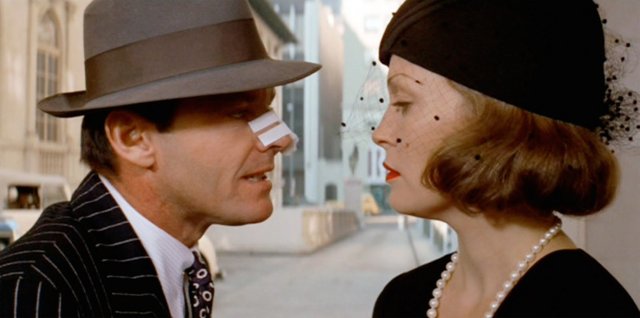
What a writing process, right in the midst of cocaine madness!
So goodbye to his endless supporting characters, goodbye to the love story of Byron Samples and Ida Samples; goodbye to Evelyn’s affair with a mystery man and Gittes’s looming jealousy, “which I felt would have been more interesting,” Towne said; goodbye to Gittes’s and Evelyn’s protracted and suspicious courtship, her violent outbursts, his many faraway mentions of Chinatown; goodbye to Julian Cross’s drug addiction; Julie’s favorite scene, containing Cross’s eerie aria to the sweet smell of horseshit; goodbye to the betrayal of Gittes by his partners, Duffy and Walsh, and his extended consultation with his lawyer, Bressler; goodbye to Escobar’s jagged history with the Cross family; goodbye to Gittes’s passion, Towne’s passion really, for Seabiscuit, intended to contain Gittes’s uptown ambitions; goodbye to Chinatown’s multiple points of view: “You [should] never show things that happen in [Gittes’s] absence,” Polanski said; goodbye to the slowly encroaching paranoia, the hurricane of subplots that swirled around Gittes; goodbye to everything that wasn’t water. Everything, Polanski decreed, had to move the water mystery forward; if they could cut it, they should cut it. But when it came to certain elements—namely, the love story (Towne wanted more scenes; Polanski, certain a good sex scene would suffice, fewer) and of course the ending—Towne and Polanski had two opposing definitions of “could.” They fought. Their arguments were painful. Each was smart enough to see the virtues in the other’s strategy; both were correct.
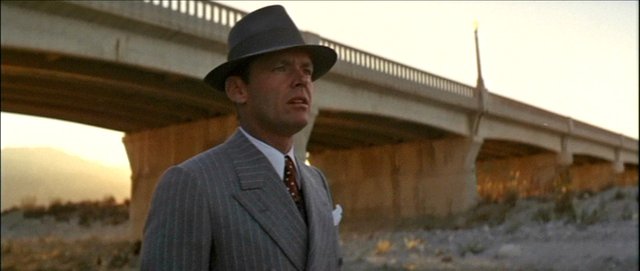
On the coffee table there was a bowl of cash to take from—to remind his many friends and lovers that he was still, despite his earnings, very much the Weaver of Pupi’s. There was also an opulent cocaine pyramid, pointing skyward in a help-yourself bowl in the foyer. For Polanski, this was a welcome change from the Lotus Apartments. At Nicholson’s, the ghosts were slower to find him. But when night came and the living room dimmed, city lights stalked the windows, and the mood moved down and away, to Sharon and to Chinatown. Polanski saw why he had come back: It was because he had never left.
There are many great things about this book. The main gripe that I have with it, is that the rhythm of the book is unwavering in its hard-boiled film-noirish sensibility; it becomes a kind of parody of the times that it wants to display.
Yet, there is more behind the surface than the above. Wasson does go into Polanski's rape of a child, Sharon Tate's murder, the follow-up film—The Two Jakes—but leaves very little to chance. Reading this book is akin to a whodunnit by Christopher Brookmyre: a well-written tale that twists and hints throughout, and delivers well. I recommend this to all who are interested in the second golden age of Hollywood and who want to see a true work of art come into existence.
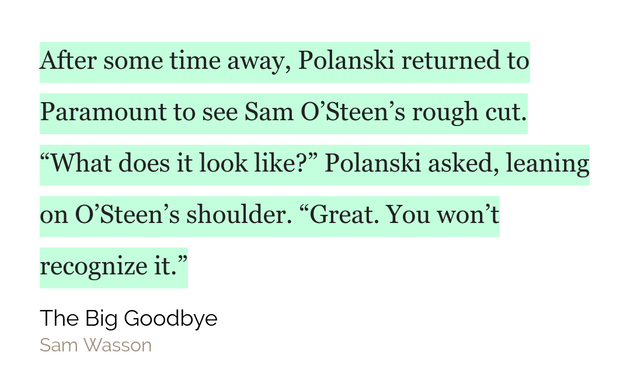
Posted from my blog with SteemPress : https://niklasblog.com/?p=24246